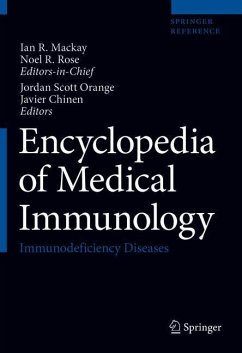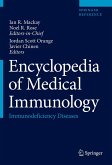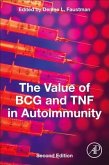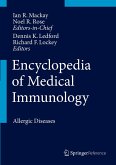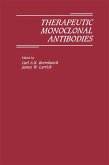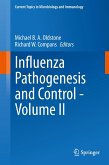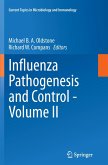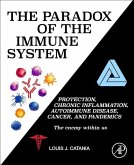Encyclopedia of Medical Immunology
Immunodeficiency Diseases
Herausgegeben:MacKay, Ian R.; Rose, Noel R.; Orange, Jordan Scott; Chinen, Javier
Versandkostenfrei innerhalb Deutschlands
446,99 €
inkl. MwSt.
Versandkostenfrei*
Liefertermin unbestimmt
Melden Sie sich
hier
hier
für den Produktalarm an, um über die Verfügbarkeit des Produkts informiert zu werden.

223 °P sammeln
Encyclopedia of Medical Immunology
Immunodeficiency Diseases
Herausgegeben:MacKay, Ian R.; Rose, Noel R.; Orange, Jordan Scott; Chinen, Javier
- Broschiertes Buch
Volume Immunodeficiency Diseases in Springer's gold-standard reference work on medical immunology focuses on infectious diseases. In tandem with its three counterpart volumes it offers the most wide-ranging and authoritative repository of knowledge on infectious diseases, with readily accessed contributions by the world's leading authorities on the subject. The encyclopedia covers the material from all angles, with more than 1000 pages of essays on the genetics, physiology, metabolism, pathogenesis and applied microbiology of all known infectious diseases, and includes access to an e-reference…mehr
Andere Kunden interessierten sich auch für
![Encyclopedia of Medical Immunology Encyclopedia of Medical Immunology]() Encyclopedia of Medical Immunology335,99 €
Encyclopedia of Medical Immunology335,99 €![The Value of Bcg and Tnf in Autoimmunity The Value of Bcg and Tnf in Autoimmunity]() The Value of Bcg and Tnf in Autoimmunity98,99 €
The Value of Bcg and Tnf in Autoimmunity98,99 €![Encyclopedia of Medical Immunology Encyclopedia of Medical Immunology]() Encyclopedia of Medical Immunology373,99 €
Encyclopedia of Medical Immunology373,99 €![Therapeutic Monoclonal Antibodies Therapeutic Monoclonal Antibodies]() James W. LarrickTherapeutic Monoclonal Antibodies110,99 €
James W. LarrickTherapeutic Monoclonal Antibodies110,99 €![Influenza Pathogenesis and Control - Volume II Influenza Pathogenesis and Control - Volume II]() Influenza Pathogenesis and Control - Volume II112,99 €
Influenza Pathogenesis and Control - Volume II112,99 €![Influenza Pathogenesis and Control - Volume II Influenza Pathogenesis and Control - Volume II]() Influenza Pathogenesis and Control - Volume II112,99 €
Influenza Pathogenesis and Control - Volume II112,99 €![The Paradox of the Immune System The Paradox of the Immune System]() Louis J. CataniaThe Paradox of the Immune System117,99 €
Louis J. CataniaThe Paradox of the Immune System117,99 €-
-
-
Volume Immunodeficiency Diseases in Springer's gold-standard reference work on medical immunology focuses on infectious diseases. In tandem with its three counterpart volumes it offers the most wide-ranging and authoritative repository of knowledge on infectious diseases, with readily accessed contributions by the world's leading authorities on the subject. The encyclopedia covers the material from all angles, with more than 1000 pages of essays on the genetics, physiology, metabolism, pathogenesis and applied microbiology of all known infectious diseases, and includes access to an e-reference work that will include ongoing updates reflecting the latest advances in the field.
An outstanding new resource of immense value to a wide range of medical researchers and practitioners, the encyclopedia features a user-friendly subdivision of diseases according to their affective locus in the human body. The sections cover integumentary, skeletal, respiratory, digestive, urinary, and reproductive transmissible pathogens. This high-profile encyclopedia will be an essential addition to academic libraries worldwide.
An outstanding new resource of immense value to a wide range of medical researchers and practitioners, the encyclopedia features a user-friendly subdivision of diseases according to their affective locus in the human body. The sections cover integumentary, skeletal, respiratory, digestive, urinary, and reproductive transmissible pathogens. This high-profile encyclopedia will be an essential addition to academic libraries worldwide.
Produktdetails
- Produktdetails
- Verlag: Springer / Springer New York / Springer, Berlin
- Artikelnr. des Verlages: 978-1-4614-8679-4
- 1st ed. 2020
- Seitenzahl: 729
- Erscheinungstermin: 10. November 2020
- Englisch
- Abmessung: 254mm x 178mm
- ISBN-13: 9781461486794
- ISBN-10: 1461486793
- Artikelnr.: 39158186
- Herstellerkennzeichnung
- Libri GmbH
- Europaallee 1
- 36244 Bad Hersfeld
- gpsr@libri.de
- Verlag: Springer / Springer New York / Springer, Berlin
- Artikelnr. des Verlages: 978-1-4614-8679-4
- 1st ed. 2020
- Seitenzahl: 729
- Erscheinungstermin: 10. November 2020
- Englisch
- Abmessung: 254mm x 178mm
- ISBN-13: 9781461486794
- ISBN-10: 1461486793
- Artikelnr.: 39158186
- Herstellerkennzeichnung
- Libri GmbH
- Europaallee 1
- 36244 Bad Hersfeld
- gpsr@libri.de
Professor Ian Mackay is an Honorary Professional Research Fellow of Monash University, Australia, and member of the Department of Biochemistry and Molecular Biology. In a career spanning over six decades, with over 700 publications, Professor Mackay has gained international recognition as a pioneer in the area of autoimmunity; with his research contributing to the development of immunosuppressive treatment for autoimmune diseases. In recognition of his service to medical research, Prof. Mackay was included in the 1981 Australia Day Honours list and was appointed as a Member of the Order of Australia. In 2001 he was awarded the Centenary Medal for service to Australian society and science in biochemistry and molecular biology. Dr. Rose is the Director of Center for Autoimmune Disease Research and a Professor in the Department of Pathology (with joint appointment in Department of Medicine), the Johns Hopkins University School of Medicine and a Professor in the W. Henry Feinstone Department of Molecular Microbiology and Immunology, the Johns Hopkins University Bloomberg School of Public Health. Dr. Rose also served as the Chairman of the Autoimmune Diseases Coordinating Committee of the National Institutes of Health and a principal advisor to the former U.S. NIH Director Dr. Elias A. Zerhouni. He was the Chairman of the W. Henry Feinstone Department of Molecular Microbiology and Immunology of the Johns Hopkins University Bloomberg School of Public Health for more than a decade. Dr. Rose's pioneering studies on autoimmune thyroiditis and myocarditis helped to initiate the modern era of research on autoimmune diseases. Dr. Rose and his colleagues have continued to contribute to our understanding of autoimmunity, including the first demonstration of the genetic factors responsible for predisposition to autoimmune disease in animals and more recent investigations on the influence of infection and environmental agents in the initiation of autoimmune disease in genetically predisposed animals. Dr. Rose is the co-author of the textbook The Autoimmune Diseases (now 3rd edition) and former Editor-in-Chief of Clinical Immunology. He is currently the Editor-in-Chief of The Year in Immunology.
Complement Deficiencies: C1 Deficiency and Associated Disorders.- C5b-C9 Deficiency.- Complement C3 Deficiency.- Complement Component C2 Deficiency.- Associated with Atypical Hemolytic Uremic Syndrome.- Complete Deficiency of Complement C4.- Ficolin-3.- Hereditary Deficiency of C1 Inhibitor and Angioedema.- Mannose-Binding Lectin-Associated Serine Protease-2 (MASP-2) Deficiency.- Primary and Secondary CD59 Deficiency.- Properdin Deficiency.- Dysregulation-CD27 Deficiency.- DKC1, Dyskeratosis Congenita/Hoyeraal-Hreidarsson Syndrome.- FAAP24 Deficiency.- PRF1 Deficiency.- STX11 Deficiency.- STXBP2 Deficiency.- TERC Deficiency.- TERT.- UNC13D Deficiency.- XIAP Deficiency.- Defects in Innate Immunity: Anhidrotic Ectodermal Dysplasia with Immunodeficiency (EDA-ID), Autosomal-Dominant.- Anhidrotic Ectodermal Dysplasia with Immunodeficiency (EDA-ID), X-linked.- APOL-1 Variants, Susceptibility and Resistance to Trypanosomiasis.- CARD9 Deficiency.- Chronic Mucocutaneous Candidiasis, ACT1 Deficiency.- Chronic Mucocutaneous Candidiasis, IL-17F Deficiency.- Chronic Mucocutaneous Candidiasis, STAT1 Gain of Function.- Chronic Mucocutaneous Candidiasis: IL-17RA Deficiency.- EVER1 and EVER2 Mutations in Epidermodysplasia Verruciformis.- IRF3 Deficiency.- Isolated Congenital Asplenia (ICA) and Mutations in RPSA.- Predisposition to Severe Viral Infection, MCM4 Deficiency.- Predisposition to Severe Viral Infection, STAT2 Deficiency.- TBK1 Deficiency.- TIR Signaling Pathway Deficiency, HOIL1 Deficiency.- TIR Signaling Pathway Deficiency, IRAK-4 Deficiency.- TIR Signaling Pathway Deficiency, MyD88 Deficiency.- TLR3 Deficiency.- TRAF3 Deficiency.- TRIF Deficiency.- UNC93B1 Deficiency.- Warts, Hypogammaglobulinemia, Infections, Myelokathexis (WHIM) Syndrome.- Combined Immunodeficiencies: B Cell Lymphoma/Leukemia 10 Deficiency.- Caspase Recruitment Domain 11, CARD11.- CD3d,e and z Deficiencies.- CD40 Deficiency, Hyper-IgM Syndrome Type 3 (OMIM # 606843).- CD8 alpha (CD8A) Deficiency.- Cytidine 5-Prime Triphosphate Synthase 1 (CTPS1) Deficiency (OMIM # 615897).- Dedicator of Cytokinesis 2: DOCK2 Deficiency.- DOCK8 Deficiency.- ICOS (Inducible T-Cell Costimulatory) Deficiency (OMIM # 607594).- IKBKB Deficiency.- IL21, Deficiency of.- IL21Receptor, Deficiency of.- ITK Deficiency.- LRBA (Lipopolysaccharide-Responsive and Beige-Like Anchor Protein) Deficiency (OMIM# 614700).- Lymphocyte Specific Protein Tyrosine Kinase, LCK.- MAGT1 Deficiency.- MALT1 Deficiency.- Mammalian sterile 20-like 1 (MST1) deficiency.- MHC Class I, A Deficiency of.- MHC Class II, Deficiency of.- NF-kappa B-Inducing Kinase (NIK).- Omenn Deficiency.- OX40 Deficiency.- Ras Homolog Family Member H (RHOH) Deficiency.- TCR- alpha Deficiency.- X-Linked Hyper-IgM Syndrome: CD40Ligand Deficiency (OMIM # 308230).- ZAP70 Deficiency (OMIM # 176947).- Combined Immunodeficiencies with Associated or Syndromic Features: ADA and PNP Deficiency.- Telangiectasia (ATM).- Ataxia-Telangiectasia-Like Disorder (ATLD).- Autosomal Dominant Anhidrotic Ectodermal Dysplasia with Immunodeficiency (AD-EDA-ID).- Autosomal Dominant Hyper IgE Syndrome.- Bloom Syndrome.- Calcium Channel Defects (STIM1 and ORAI1).- Cartilage Hair Hypoplasia (RMRP).- CHARGE Syndrome (CHD7, SEMA3E).- Clinical Presentation of Polymerase E1 (POLE1) and Polymerase E2 (POLE2) Deficiencies.- Comel-Netherton Syndrome (SPINK5).- Defects in B12 and Folate Metabolism (TCN2, SLC46A1 (PCFT Deficiency), MTHFD1).- DiGeorge Anomaly (del22q11).- Down Syndrome.- Hepatic Veno-occlusive Disease with Immunodeficiency (VODI).- IKAROS (IKZF1) Deficiency.- Immunodeficiency with Multiple Intestinal Atresias (TTC7A).- Immunodeficiency, Centromeric Instability, and Facial Dysmorphism (ICF Syndrome) (ICF1-DNMT3B, ICF-2 ZBTB24).- Jacobsen Syndrome.- Kabuki Syndrome.- LUBAC Deficiencies.- MCM4 Deficiency.- Nijmegen Breakage Syndrome (NBS1).- PGM3-deficiency.- PMS2 Deficiency.- RIDDLE Syndrome (RNF168).- Schimke Immuno-osseous Dysplasia.- Short Telomere Syndromes.- STAT5b Deficiency, AR.- TCN2 Deficiency.- Winged Helix Deficiency (FOXN1).- Wiskott-Aldrich Syndrome Deficiency.- Wiskott-Aldrich Syndrome Protein-Interacting Protein (WIP) Deficiency.- Predominantly Antibody deficiency:Activated PI3-Kinase Delta Syndrome (APDS)/p110d-Activating Mutations Causing Senescent T Cells, Lymphadenopathy, and Immunodeficiency (PASLI).- Baff-Receptor Deficiency.- BLNK Deficiency.- CD19 Deficiency Due to Genetic Defects in the CD19 and CD81 Genes.- CD20 Deficiency, Lessons Related to Therapeutic Biologicals and Primary Immunodeficiency.- CD21 Deficiency.- CVID.- E47 Transcription Factor.- Good Syndrome.- ICOS Deficiency.- Ig heavy chain mutations and deletions.- IgA Deficiency With or Without IgG Subclass Deficiencies.- Ig Deficiency.- Igbeta Deficiency.- Immunoglobulin Class Switch Recombination Defects.- Isolated IgG subclass Deficiency.- PIK3R1 Deficiency-Associated Agammaglobulinemia.- Serum Immunoglobulin Isotypes with Decreased or Absent B Cells, Reduction of.- TACI and CVID.- TNFS12: TWEAK Deficiency.- Transcient hypogammaglobulinemia of infancy with normal numbers of B cells.- Unclassified antibody deficiency (UnPAD).- WHIM Syndrome.- X-linked Agammaglobulinemia (BTK Deficiency).- 5 Deficiency.- mi Heavy Chain Deficiency.- Autoinflammatory Disorders: Aicardi-Goutières Syndrome (AGS1-AGS7).- Blau Syndrome.- CARD14-Mediated Psoriasis and Pityriasis Rubra Piliaris (PRP).- Chronic Atypical Neutrophilic Dermatosis with Lipodystrophy and Elevated temperature syndrome (CANDLE)/Proteasome Associated Autoinflammatory Syndromes (PRAAS).- COPA Syndrome.- Cranial Developmental Disorder Cherubism.- DADA2.- Deficiency of Interleukin 36 Receptor Antagonist (DITRA).- Deficiency of the IL-1 Receptor Antagonist (DIRA).- Familial Cold Autoinflammatory Syndrome (FCAS) and Muckle-Wells Syndrome (MWS).- Familial Mediterranean Fever and Pyrin-Associated Autoinflammatory Syndromes.- Introduction to Autoinflammatory Diseases.- Majeed Syndrome.- Mevalonate Kinase Deficiency (MKD).- NEMO- deleted exon 5 autoinflammatory syndrome (NDAS).- Neonatal-Onset Multisystem Inflammatory Disease (NOMID).- NLRC4-Associated Autoinflammatory Diseases.- OTULIN Deficiency-Associated Disease Spectrum.- PLAID and APLAID.- Pyogenic Arthritis, Pyoderma Gangrenosum, and Acne (PAPA) Syndrome.- STING-Associated Vasculopathy with Onset in Infancy (SAVI).- TNF receptor associated periodic syndrome (TRAPS).- Defects of Phagocyte Number, Function, or Both: 3-Methylglutaconic Aciduria.- Autosomal Recessive CGD (NCF-1, NCF-2, CYBA, NCF4).- B-Actin Deficiency.- Barth Syndrome.- Cohen Syndrome.- CYBB X-Linked Chronic Granulomatous Disease (CGD).- Cyclic Neutropenia.- Elastase Deficiency, Severe Congenital Neutropenia (SCN) 1.- G-CSF Receptor Deficiency.- Glycogen Storage Disease Type 1b.- JAGN1 Deficiency.- Leukocyte Adhesion Deficiency Syndromes.- Localized Juvenile Periodontitis.- P14/LAMTOR2 Deficiency.- Papillon-Lefèvre Syndrome.- Rac2 Deficiency.- SCN2 (GFI 1 Deficiency).- SCN3 (Kostmann Disease).- SCN4 (G6PC3 Deficiency).- SCN5 (VPS45 Deficiency).- Shwachman-Diamond Syndrome.- Specific Granule Deficiency.- X-Linked Neutropenia/Myelodysplasia.- Evaluation and Management of Immunodeficiency: Clinical Presentation of Immunodeficiency, Overview.- Clinical Presentation of Immunodeficiency, Primary Immunodeficiency.- Clinical Presentation of Immunodeficiency, Secondary Immunodeficiency.- Evaluation of Suspected Immunodeficiency, Cellular.- Evaluation of Suspected Immunodeficiency, Flow Cytometry.- Evaluation of Suspected Immunodeficiency, Genetic Testing.- Evaluation of Suspected Immunodeficiency, Humoral.- Evaluation of Suspected Immunodeficiency, Internet Resources.- Evaluation of Suspected Immunodeficiency, Overview.- Innate Immune Defects, Clinical Presentation.- Management of Immunodeficiency, Antibiotic therapy.- Management of Immunodeficiency, Bone Marrow Transplantation.- Management of Immunodeficiency, IgG Replacement (IV).- Management of Immunodeficiency, IgG Replacement (SC).- Management of Immunodeficiency, Overview.- Management of Immunodeficiency, Quality of Life.- Management of Immunodeficiency: Gene Therapy.
Complement Deficiencies: C1 Deficiency and Associated Disorders.- C5b-C9 Deficiency.- Complement C3 Deficiency.- Complement Component C2 Deficiency.- Associated with Atypical Hemolytic Uremic Syndrome.- Complete Deficiency of Complement C4.- Ficolin-3.- Hereditary Deficiency of C1 Inhibitor and Angioedema.- Mannose-Binding Lectin-Associated Serine Protease-2 (MASP-2) Deficiency.- Primary and Secondary CD59 Deficiency.- Properdin Deficiency.- Dysregulation-CD27 Deficiency.- DKC1, Dyskeratosis Congenita/Hoyeraal-Hreidarsson Syndrome.- FAAP24 Deficiency.- PRF1 Deficiency.- STX11 Deficiency.- STXBP2 Deficiency.- TERC Deficiency.- TERT.- UNC13D Deficiency.- XIAP Deficiency.- Defects in Innate Immunity: Anhidrotic Ectodermal Dysplasia with Immunodeficiency (EDA-ID), Autosomal-Dominant.- Anhidrotic Ectodermal Dysplasia with Immunodeficiency (EDA-ID), X-linked.- APOL-1 Variants, Susceptibility and Resistance to Trypanosomiasis.- CARD9 Deficiency.- Chronic Mucocutaneous Candidiasis, ACT1 Deficiency.- Chronic Mucocutaneous Candidiasis, IL-17F Deficiency.- Chronic Mucocutaneous Candidiasis, STAT1 Gain of Function.- Chronic Mucocutaneous Candidiasis: IL-17RA Deficiency.- EVER1 and EVER2 Mutations in Epidermodysplasia Verruciformis.- IRF3 Deficiency.- Isolated Congenital Asplenia (ICA) and Mutations in RPSA.- Predisposition to Severe Viral Infection, MCM4 Deficiency.- Predisposition to Severe Viral Infection, STAT2 Deficiency.- TBK1 Deficiency.- TIR Signaling Pathway Deficiency, HOIL1 Deficiency.- TIR Signaling Pathway Deficiency, IRAK-4 Deficiency.- TIR Signaling Pathway Deficiency, MyD88 Deficiency.- TLR3 Deficiency.- TRAF3 Deficiency.- TRIF Deficiency.- UNC93B1 Deficiency.- Warts, Hypogammaglobulinemia, Infections, Myelokathexis (WHIM) Syndrome.- Combined Immunodeficiencies: B Cell Lymphoma/Leukemia 10 Deficiency.- Caspase Recruitment Domain 11, CARD11.- CD3d,e and z Deficiencies.- CD40 Deficiency, Hyper-IgM Syndrome Type 3 (OMIM # 606843).- CD8 alpha (CD8A) Deficiency.- Cytidine 5-Prime Triphosphate Synthase 1 (CTPS1) Deficiency (OMIM # 615897).- Dedicator of Cytokinesis 2: DOCK2 Deficiency.- DOCK8 Deficiency.- ICOS (Inducible T-Cell Costimulatory) Deficiency (OMIM # 607594).- IKBKB Deficiency.- IL21, Deficiency of.- IL21Receptor, Deficiency of.- ITK Deficiency.- LRBA (Lipopolysaccharide-Responsive and Beige-Like Anchor Protein) Deficiency (OMIM# 614700).- Lymphocyte Specific Protein Tyrosine Kinase, LCK.- MAGT1 Deficiency.- MALT1 Deficiency.- Mammalian sterile 20-like 1 (MST1) deficiency.- MHC Class I, A Deficiency of.- MHC Class II, Deficiency of.- NF-kappa B-Inducing Kinase (NIK).- Omenn Deficiency.- OX40 Deficiency.- Ras Homolog Family Member H (RHOH) Deficiency.- TCR- alpha Deficiency.- X-Linked Hyper-IgM Syndrome: CD40Ligand Deficiency (OMIM # 308230).- ZAP70 Deficiency (OMIM # 176947).- Combined Immunodeficiencies with Associated or Syndromic Features: ADA and PNP Deficiency.- Telangiectasia (ATM).- Ataxia-Telangiectasia-Like Disorder (ATLD).- Autosomal Dominant Anhidrotic Ectodermal Dysplasia with Immunodeficiency (AD-EDA-ID).- Autosomal Dominant Hyper IgE Syndrome.- Bloom Syndrome.- Calcium Channel Defects (STIM1 and ORAI1).- Cartilage Hair Hypoplasia (RMRP).- CHARGE Syndrome (CHD7, SEMA3E).- Clinical Presentation of Polymerase E1 (POLE1) and Polymerase E2 (POLE2) Deficiencies.- Comel-Netherton Syndrome (SPINK5).- Defects in B12 and Folate Metabolism (TCN2, SLC46A1 (PCFT Deficiency), MTHFD1).- DiGeorge Anomaly (del22q11).- Down Syndrome.- Hepatic Veno-occlusive Disease with Immunodeficiency (VODI).- IKAROS (IKZF1) Deficiency.- Immunodeficiency with Multiple Intestinal Atresias (TTC7A).- Immunodeficiency, Centromeric Instability, and Facial Dysmorphism (ICF Syndrome) (ICF1-DNMT3B, ICF-2 ZBTB24).- Jacobsen Syndrome.- Kabuki Syndrome.- LUBAC Deficiencies.- MCM4 Deficiency.- Nijmegen Breakage Syndrome (NBS1).- PGM3-deficiency.- PMS2 Deficiency.- RIDDLE Syndrome (RNF168).- Schimke Immuno-osseous Dysplasia.- Short Telomere Syndromes.- STAT5b Deficiency, AR.- TCN2 Deficiency.- Winged Helix Deficiency (FOXN1).- Wiskott-Aldrich Syndrome Deficiency.- Wiskott-Aldrich Syndrome Protein-Interacting Protein (WIP) Deficiency.- Predominantly Antibody deficiency:Activated PI3-Kinase Delta Syndrome (APDS)/p110d-Activating Mutations Causing Senescent T Cells, Lymphadenopathy, and Immunodeficiency (PASLI).- Baff-Receptor Deficiency.- BLNK Deficiency.- CD19 Deficiency Due to Genetic Defects in the CD19 and CD81 Genes.- CD20 Deficiency, Lessons Related to Therapeutic Biologicals and Primary Immunodeficiency.- CD21 Deficiency.- CVID.- E47 Transcription Factor.- Good Syndrome.- ICOS Deficiency.- Ig heavy chain mutations and deletions.- IgA Deficiency With or Without IgG Subclass Deficiencies.- Ig Deficiency.- Igbeta Deficiency.- Immunoglobulin Class Switch Recombination Defects.- Isolated IgG subclass Deficiency.- PIK3R1 Deficiency-Associated Agammaglobulinemia.- Serum Immunoglobulin Isotypes with Decreased or Absent B Cells, Reduction of.- TACI and CVID.- TNFS12: TWEAK Deficiency.- Transcient hypogammaglobulinemia of infancy with normal numbers of B cells.- Unclassified antibody deficiency (UnPAD).- WHIM Syndrome.- X-linked Agammaglobulinemia (BTK Deficiency).- 5 Deficiency.- mi Heavy Chain Deficiency.- Autoinflammatory Disorders: Aicardi-Goutières Syndrome (AGS1-AGS7).- Blau Syndrome.- CARD14-Mediated Psoriasis and Pityriasis Rubra Piliaris (PRP).- Chronic Atypical Neutrophilic Dermatosis with Lipodystrophy and Elevated temperature syndrome (CANDLE)/Proteasome Associated Autoinflammatory Syndromes (PRAAS).- COPA Syndrome.- Cranial Developmental Disorder Cherubism.- DADA2.- Deficiency of Interleukin 36 Receptor Antagonist (DITRA).- Deficiency of the IL-1 Receptor Antagonist (DIRA).- Familial Cold Autoinflammatory Syndrome (FCAS) and Muckle-Wells Syndrome (MWS).- Familial Mediterranean Fever and Pyrin-Associated Autoinflammatory Syndromes.- Introduction to Autoinflammatory Diseases.- Majeed Syndrome.- Mevalonate Kinase Deficiency (MKD).- NEMO- deleted exon 5 autoinflammatory syndrome (NDAS).- Neonatal-Onset Multisystem Inflammatory Disease (NOMID).- NLRC4-Associated Autoinflammatory Diseases.- OTULIN Deficiency-Associated Disease Spectrum.- PLAID and APLAID.- Pyogenic Arthritis, Pyoderma Gangrenosum, and Acne (PAPA) Syndrome.- STING-Associated Vasculopathy with Onset in Infancy (SAVI).- TNF receptor associated periodic syndrome (TRAPS).- Defects of Phagocyte Number, Function, or Both: 3-Methylglutaconic Aciduria.- Autosomal Recessive CGD (NCF-1, NCF-2, CYBA, NCF4).- B-Actin Deficiency.- Barth Syndrome.- Cohen Syndrome.- CYBB X-Linked Chronic Granulomatous Disease (CGD).- Cyclic Neutropenia.- Elastase Deficiency, Severe Congenital Neutropenia (SCN) 1.- G-CSF Receptor Deficiency.- Glycogen Storage Disease Type 1b.- JAGN1 Deficiency.- Leukocyte Adhesion Deficiency Syndromes.- Localized Juvenile Periodontitis.- P14/LAMTOR2 Deficiency.- Papillon-Lefèvre Syndrome.- Rac2 Deficiency.- SCN2 (GFI 1 Deficiency).- SCN3 (Kostmann Disease).- SCN4 (G6PC3 Deficiency).- SCN5 (VPS45 Deficiency).- Shwachman-Diamond Syndrome.- Specific Granule Deficiency.- X-Linked Neutropenia/Myelodysplasia.- Evaluation and Management of Immunodeficiency: Clinical Presentation of Immunodeficiency, Overview.- Clinical Presentation of Immunodeficiency, Primary Immunodeficiency.- Clinical Presentation of Immunodeficiency, Secondary Immunodeficiency.- Evaluation of Suspected Immunodeficiency, Cellular.- Evaluation of Suspected Immunodeficiency, Flow Cytometry.- Evaluation of Suspected Immunodeficiency, Genetic Testing.- Evaluation of Suspected Immunodeficiency, Humoral.- Evaluation of Suspected Immunodeficiency, Internet Resources.- Evaluation of Suspected Immunodeficiency, Overview.- Innate Immune Defects, Clinical Presentation.- Management of Immunodeficiency, Antibiotic therapy.- Management of Immunodeficiency, Bone Marrow Transplantation.- Management of Immunodeficiency, IgG Replacement (IV).- Management of Immunodeficiency, IgG Replacement (SC).- Management of Immunodeficiency, Overview.- Management of Immunodeficiency, Quality of Life.- Management of Immunodeficiency: Gene Therapy.
